The Patriots Are Underdogs in Their Own Minds, and That’s What Matters

This story appears in the Jan. 28, 2019, issue of Sports Illustrated. For more great storytelling and in-depth analysis, subscribe to the magazine—and get up to 94% off the cover price. Click here for more.
Here came those underdogs from New England, those plucky footballers nobody believed in, set to star in some NFL version of Rudy as they descended on Kansas City to shoot slingshots at the mighty Chiefs. That was the sell, anyway, even if the narrative the Patriots peddled in the lead-up to the AFC championship game ignored a few basic facts. Like: 1) Tom Brady, 2) Bill Belichick and 3) Patriots.
And yet it’s true: Not everyone believed in them, this team that won fewer than 12 games for the first time since 2009 and went 3–5 on the road. Word was out that Brady had suffered some sort of knee injury toward the end of the season. (Two sources confirm this was a left MCL sprain.) All-world tight end Rob Gronkowski, hobbled by back and ankle issues, appeared older and slower. Wide receiver Josh Gordon, their only deep threat, had left the team in December, citing personal issues. Perhaps the end of the Death Star win-machine era indeed drew near.
And yet, Come on! These were the Patriots, winners of five Super Bowls and a record 10 conference championship games, with a coach who had 290 career victories. (No active coach is within 80 of that.) If they were to beat the Chiefs, they would match the Steelers’ record with a 36th playoff win. Doubt them at your own peril.
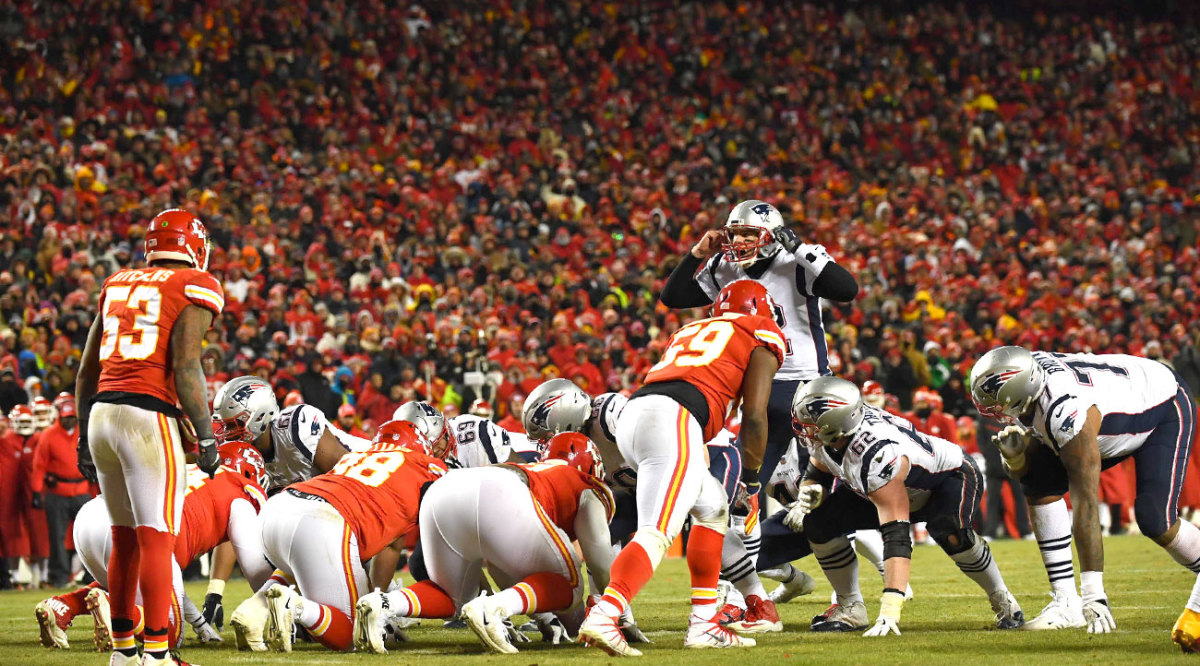
Belichick wanted his players to feel like underdogs, at least—to think nobody outside their locker room believed. For almost 20 years now he’s been persuading his guys they’re not as good as people say they are, all while steamrolling through season after season.
“Even when it wasn’t true, it worked. That was the strategy,” says Deion Branch, a receiver for Belichick over seven seasons. “I don’t think we ever felt like the favorite.” Branch was on the last (and only) Pats team, in 2002, that got a full season out of Brady and didn’t make the postseason. They still finished 9–7. They also won the next two Super Bowls.
After losing a divisional-round playoff to the Jets following the 2010 season, New England has made it to every AFC title game since. This would be the eighth straight, obliterating the previous record of five, set by the Raiders between 1973 and ’77, back before the salary cap and free agency. That “won’t happen again in my lifetime,” says Ty Law, a Patriots cornerback from 1995 to 2004. “Not for 100 years, 200 years.”
BREER: Belichick’s not going anywhere, what the Patriots and Rams have in common, more Super Bowl 53 notes
And yet this team traveled to the land of barbecue without a road playoff win since 2007 . . . having won only once at Arrowhead Stadium, back in ’04 . . . having fallen twice in December, inducing panic across the Dunkin’ Donuts states. Oddsmakers installed Kansas City as a three-point favorite, making New England an actual playoff underdog for the first time since ’13. Of the final four teams, ESPN gave the Patriots the smallest chance of winning Super Bowl LIII: 15%.
Still. “Underdogs?” asks Bart Scott, who played linebacker on that 2010 New York team that upended the Pats. He laughs. “At some point you make up people to be mad at. You make up people that hate you. As the top dog, you have to.”
First, the insanity on Sunday night in frigid Missouri. The lead that changed four times in the fourth quarter; the punt that Patriots return man Julian Edelman almost muffed but just avoided touching, like a move from The Matrix (or, say, a recent Super Bowl against the Falcons); the three Patrick Mahomes touchdown passes in the final 30 minutes; and some questionable officiating. After their stunning 37–31 victory in overtime, the Patriots celebrated inside a cramped visitors’ locker room. Discarded hand warmers, half-drunk bottles of water, tangles of chords and yards of used-up athletic tape littered the floor. Large men pushed through crowds of reporters, wearing only towels and Cheshire-cat grins.
Matthew Slater, the special teams stalwart, winked and shrugged, “Once again.” True. And still the sell continued. Somewhere in the mayhem, linebacker Kyle Van Noy—he of 10 tackles and two sacks on the night—tweeted, “#wesuck,” embracing the self-deprecation, real or fabricated. Slater, meanwhile, ticked off all the doubts: the road record, too old, not athletic enough. At which point wideout Chris Hogan yelled from the next locker, “Ha-ha!” These Patriots remain in search of slights.
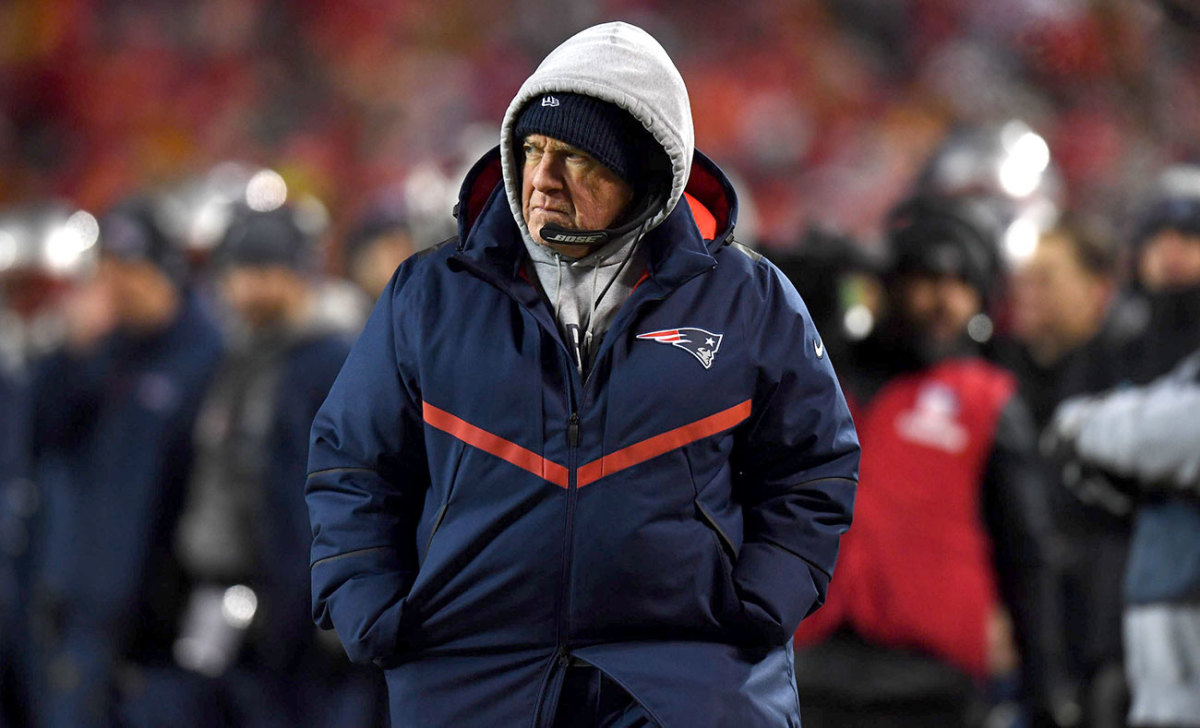
It was Slater who had called heads before the coin toss in OT, the same call he always makes. After it came up his way, he recalled, “I felt pretty good about our chances.” Why? He shrugged again. “I’ve got Tom Brady.”
But it wasn’t just Brady. It never is.
On the first and final drive of OT it was also Edelman, atoning for a fourth-quarter dropped pass turned interception with two clutch third-down grabs. It was Gronkowski (who Scott said last week “doesn’t scare anyone anymore”) with the 15-yard catch that pushed the Patriots into the red zone. And it was Rex Burkhead, the running back who had spent October and November on injured reserve, plowing into the end zone from two yards out for his second score—and the decisive one to cap a 13-play, 75-yard march. This was the third overtime playoff game for Brady. His opponents never touched the ball in any of them.
VRENTAS: The end isn’t anywhere near for Brady, Belichick and the Patriots
This game will be remembered not as much for the cold (19 degrees at kickoff), or for Belichick angrily Hulk-smashing and then chucking a tablet (after one of those questionable non-calls), or for New England’s 524 yards of total offense and 44 minutes of offensive possession. No, the guys wearing the dark-gray conference champions hats and oversized T-shirts will remember this game—and, by extension, this season—as that time they seized on the underdog ethos served up to them. Whether it was accurate or not.
Even if the story the Pats told themselves conveniently ignored some simple facts—this will be, after all, the franchise’s ninth Super Bowl appearance of the century—what mattered most was that they believed. “It wasn’t perfect,” Hogan said. But neither was their season.
If you want the latest episode of The Monday Morning NFL Podcast in your feed when you wake up Monday morning, then subscribe to The MMQB Podcasts. For non-subscribers, there is typically a soul-crushing lag.
Back in August, Robert Kraft sat on the rear patio of his Chestnut Hill, Mass., mansion and pointed at the lawn to his left, where under white tents with open bars the team he owns has celebrated each of its five championships. He would have held another soiree early last year, had the Eagles not upended his squad in Super Bowl LII, ending a season defined by the tension and tumult that usually impacts other teams, not the New England Patriots.
Kraft knew what everybody knows, that he would enter the 2018 season with a 41-year-old quarterback and a 66-year-old coach. Still, he scoffed at the idea of the Pats’ imminent demise. The next night, as Brady jogged onto the field at Gillette Stadium for the final preseason tune-up, the owner kissed the QB on the cheek, whispering, “Tom, I love you,” into his ear. “I love you, too,” Brady responded.
“See?” Kraft said immediately afterward, with a hearty laugh. “And you think we’re having problems.”
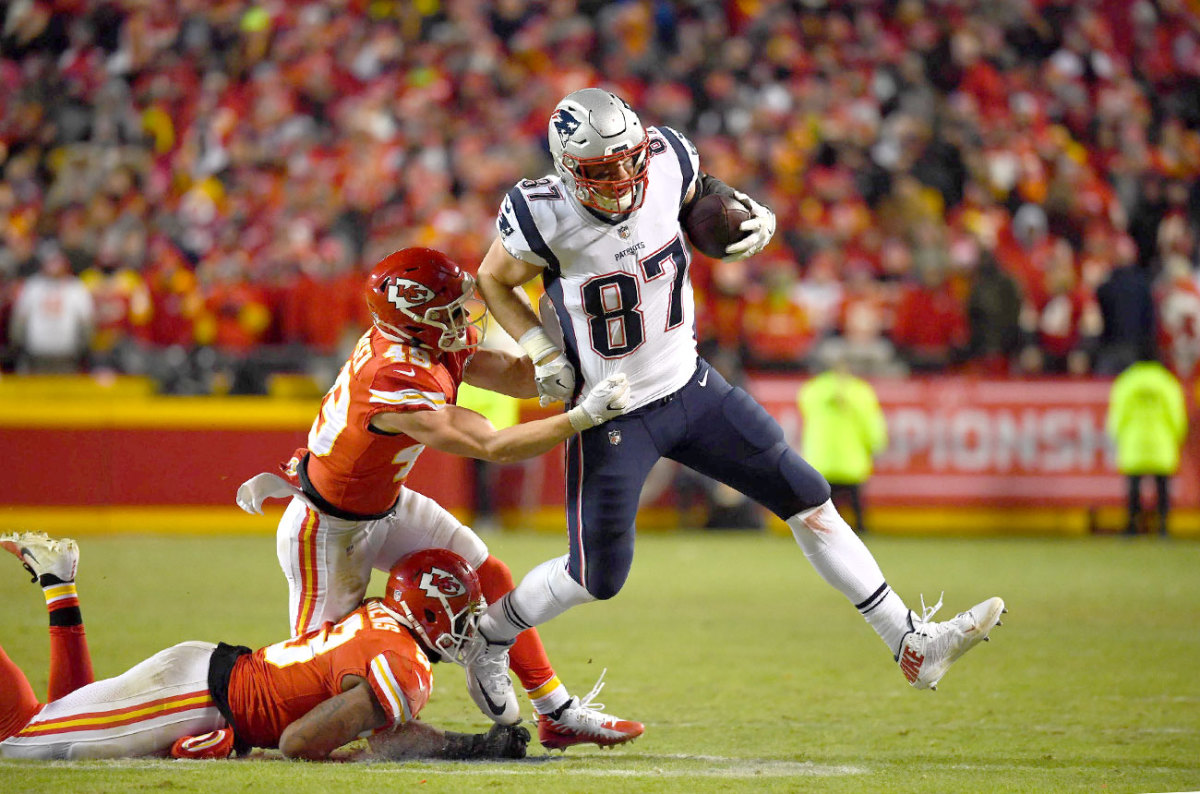
Only the Patriots did have problems, at least by their ridiculously high standards. Their drafting of Georgia running back Sony Michel with the 31st pick last April was widely perceived as a reach. (Against the Chiefs: 29 carries, 113 yards and two touchdowns.) They started the season without Brady’s favorite target, Edelman, who was suspended four games for violating the NFL’s performance-enhancing-drug policy. (This was, by most measures, one of his best seasons.) Their trade with the Browns in September for Gordon, with all his talent and all his baggage, was billed as desperate. (Never mind that he topped 70 yards receiving in five games.)
BENOIT:Early Super Bowl preview—Belichick’s plan against a Rams juggernaut
New England lost two of its first three, to the Jaguars and Lions. But the two losses in December—at Miami, on a crazy, last-second hook-and-ladder miracle that saw Gronkowski fall down on defense; then at Pittsburgh—really shook the locals. One Boston Globe columnist asked if the dynasty had finally reached its expiration date.
That loss to the Steelers came in Week 15—right around the time New England typically rounds into postseason form. Slater remembers the locker room that night, how players knew they were at their turning point: gloom or redemption. That’s when all the underdog stuff started.
Patriots film sessions are always brutal, even after wins, but cornerback Stephon Gilmore says the review after that game was particularly “rough.” Meanwhile, anyone looking for a little extra underdog material as the season wound down didn’t need to search beyond the negativity scrolling across the NFL Network ticker: Gronkowski was reportedly considering retirement; offensive coordinator Josh McDaniels was interviewing for the Packers’ head job. But these were the Patriots. Belichick and Brady. “Everyone can look for cracks,” says Branch. “They hate greatness.”
New England crushed the Chargers in the divisional round, scoring touchdowns on its first four drives to win 41–28. Brady threw for 343 yards; Michel ran for 129; Edelman vacuumed in nine balls for 151, giving him more postseason receptions (98) than anyone not named Jerry Rice.
“At the end of the day, the Patriots are the best organization in professional sports,” Law said after that mauling. “Hands down. Put it up against anybody, any era. They’re the team of the decade—twice!”
By that point, the whole underdog thing sounded pretty far-fetched—far-fetched to everyone, that is, who doesn’t report to work at One Patriot Place.
Time had almost forgotten the underdog that was Tom Brady. Forgotten that he once told a college friend he worried he’d fail in his NFL endeavors and end up in the insurance business. He even interned for two summers at the Merrill Lynch office in Ann Arbor, before his junior and senior seasons at Michigan. His boss there was Oliver Owens, who tasked Brady with reviewing portfolios, preparing for client meetings, pulling research and organizing Owens’s Rolodex.
Brady struck his boss as mature for his age. For starters, he didn’t show up to the office hung over like the other interns. He was also uncommonly meticulous in the cafeteria, carefully preparing his turkey pitas with pepper, lemon and salt. “A fine craftsman,” says Owens. Even then.
MORNING HUDDLE:How hard would it be to make pass interference reviewable?
What Brady did not strike Owens as was a future Hall of Famer. At the end of Brady’s second summer in the office, Owens told Brady he had a future in finance. Brady looked down, rubbed his hands, then said he wanted to give this football thing a try. “Tom,” Owens responded, “you’re a dime a dozen. You’re a clipboard holder, man. You have to start a career. I’ll write you a nice referral.”
“I guess he went a different way,” says Owens.
Brady possessed an unwavering belief that bordered on delusional, especially back then. Before the QB’s first playoff run, in the 2001 season, Law and some other veterans organized a team dinner at Abe & Louie’s Steakhouse in Boston. Before Brady finished his food, he told the group that the guy he’d replaced in Week 2, Drew Bledsoe, was “not getting his f------ job back!” Law remembers stealing a curious glance at safety Lawyer Milloy. “We were like, ‘O.K., that’s the spirit,’ ” he says. “Love the attitude, but . . . doubt it.” A month later, in the locker room before Super Bowl XXXVI, Brady told third-stringer Damon Huard, “We’ll know what it feels like to be world champions in three-and-a-half hours.”
And yet, after all the ensuing wins and accolades and, ultimately, ascendancy to the top of the GOAT discussion, some skeptics looked at Brady throughout this season and saw signs of decline. His yards per attempt were down for a second straight year, to 7.6, indicating a menu of shorter, safer throws. He had just 4,355 passing yards (only his seventh-best total in 19 seasons) and 29 touchdown passes (eighth best).
Tom House, Brady’s longtime throwing coach, has a better view, though, and he says, “Without a doubt, [those misgivings] were confirmation bias. I’ve seen no drop-off in effectiveness or efficiency.”
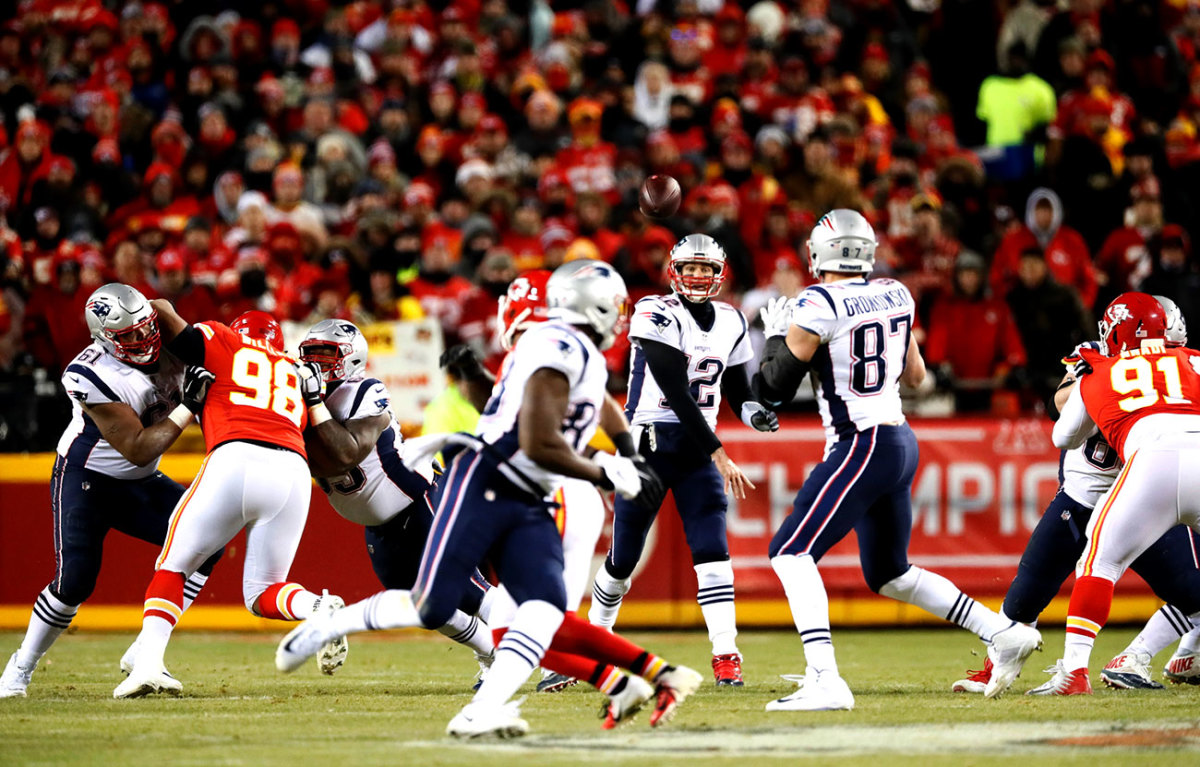
House met with Brady in Boston during the Patriots’ bye, in Week 11, according to two sources in the QB’s orbit. This marked a tune-up, nothing more, but Brady did register four passer ratings above 100 over the next seven games. “For whatever reason, people are infatuated with being able to be the first ones to say, Yep, I told you so, it’s over,” says Brady’s backup, Brian Hoyer. “Instead of just appreciating what Tom is, they want to find chinks in the armor.”
This, of course, was the same Brady the Chiefs smashed in Week 4 of the 2014 season. Analysts buried him way back then, as Belichick answered every postgame question with some version of, “We’re on to Cincinnati.” Brady won the Super Bowl that season, and then again two years after that, and he almost won again last February. “Everybody always overreacts,” says Jay Feely, an NFL kicker of 14 years and a longtime confidant of Brady’s. “Every year it’s, What’s the matter with the Patriots?”
Brady seized on those notions after the divisional round, telling CBS that “people”—always the vague people—think the Patriots “suck” and “can’t win any games.” He was taking some artistic license, in that the Patriots did have doubters and weren’t favored against the No. 1–seed Chiefs, but they were still the Patriots. Even after vanquishing the Chiefs on Sunday, Brady stood before reporters and said “the odds were stacked against us” and “it hasn’t been that way in a while.” Someone pressed him, asking if he really believed what he was selling. He’d just secured his 236th career win, tying kicker Adam Vinatieri for the most in NFL history. “Yeah,” Brady answered. Next question.
No one oozed more joy in the victorious visitors’ locker room than Jason McCourty, the cornerback acquired last offseason from the Browns. McCourty’s identical twin, Devin, had been drafted by New England in 2010 and played in so many AFC title games that Jason would have to forgive Devin if he’d started to lose count.
After that deal was inked, Devin dialed up their mother, Phyllis Harrell, on FaceTime to break the news. Cooking in her kitchen in New Jersey, she dropped what she was doing. “All I could do was scream,” she says.
BENOIT:The NFL must change its overtime rules
While Devin had become a foundation at safety on football’s dominant powerhouse, Jason had been mostly overlooked and counted out. A sixth-round pick by the Titans in 2009, he earned captaincy in Tennessee and then went winless in one season with Cleveland. He had yet to appear in a playoff game, let alone win one.
Harrell recalls one game, back in Jason’s rookie year, in 2009, while Devin was still at Rutgers. The Titans were visiting New England in mid-October, and the weather was so bad that she left at halftime, thinking, “One good thing: I’ll never have to come to this stadium again.” In the years since, after Devin landed in New England and won two Super Bowls, and after she saw dozens of games in the stadium she once despised, she hoped Jason could one day experience something like his brother had. Just once.
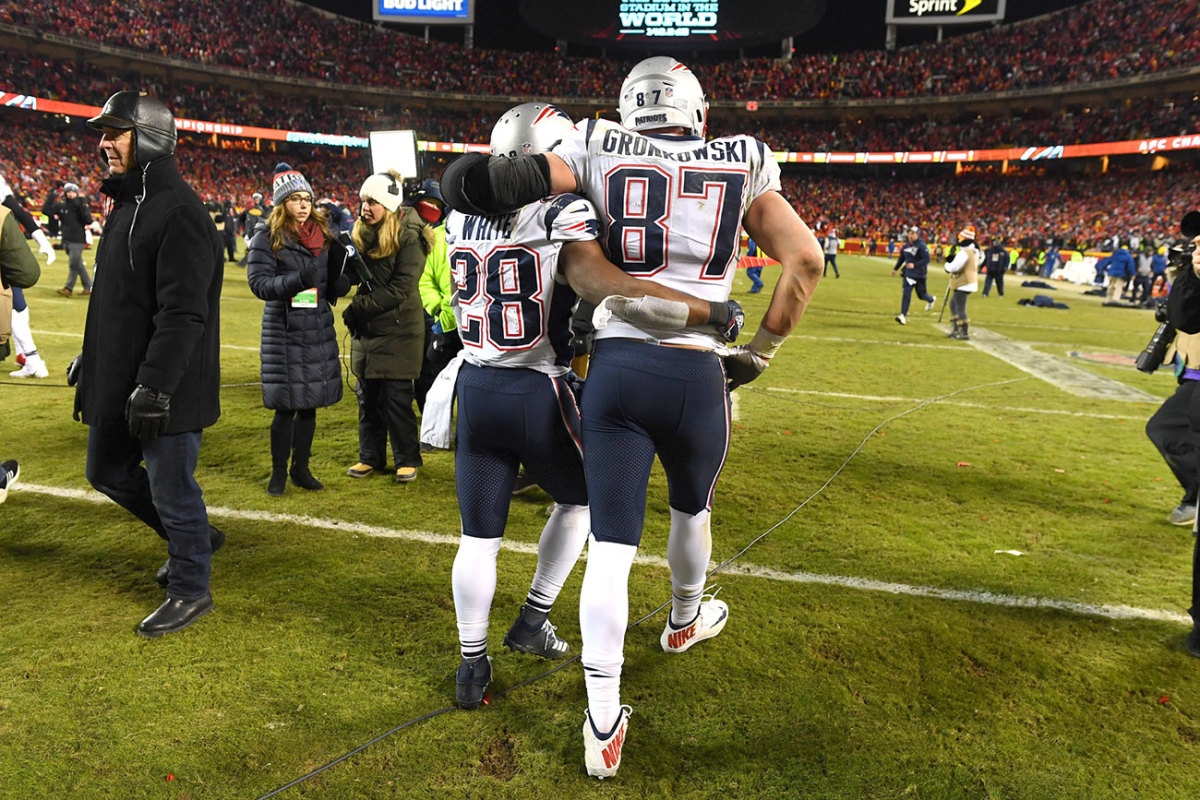
This year Harrell has been bedazzling Patriots jerseys with her sons’ numbers on them, gluing on each faux jewel by hand. “Rocky year,” she says, admitting she dreamed and prayed New England might reach this Super Bowl, with both of her sons on the roster, both playing pivotal roles.
After Burkhead plunged into the end zone, finally hushing Arrowhead on Sunday, Jason found Devin on the field. “I’m going to the Super Bowl, man!” Jason screamed. “I’m so happy you get to experience this,” Devin told him.
And there it was, an underdog story. One, anyway.
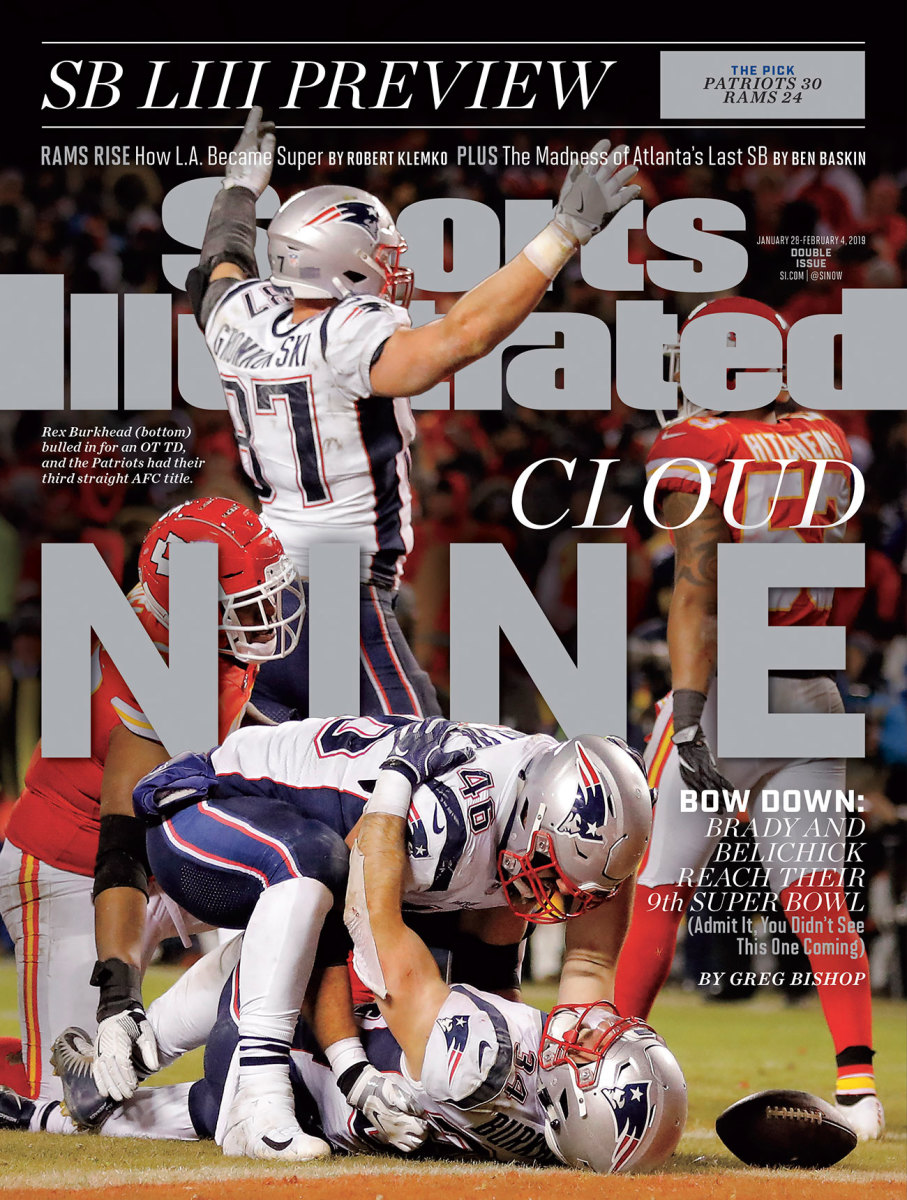
Question or comment? Email us at talkback@themmqb.com.
